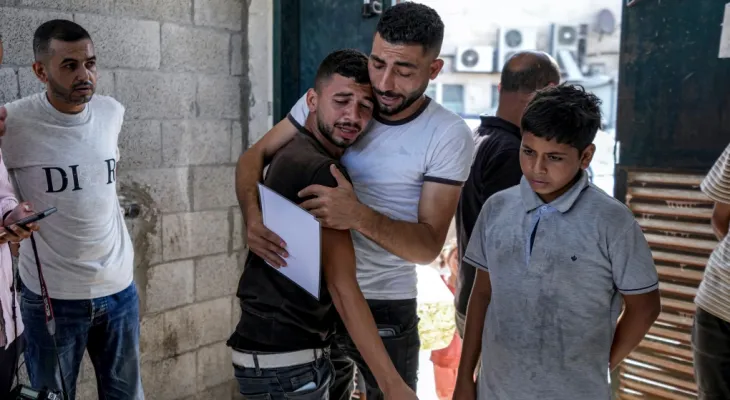Search here
Newspaper
Search here

Arab Canada News
News

Published: August 13, 2024
Reem Abu Hayya, who is only three months old, was the only member of her family to survive an Israeli airstrike on the Gaza Strip late on Monday. A few miles (kilometers) to the north, Mohammad Abu Qumsan lost his wife and their four-day-old twin children in another strike.
After more than 10 months of its war with Hamas, the ongoing Israeli bombardment of the isolated region has wiped out extended families. Parents have been left without children, and children without parents or siblings.
Some of the only survivors are so young that they do not remember whom they lost.
The Israeli strike late Monday destroyed a home near the southern city of Khan Younis, killing 10 people. Among the dead were Abu Hayya’s parents and five siblings aged between 5 and 12 years, as well as the parents of three other children. The four children were injured in the strike.
Her aunt, Suad Abu Hayya, said: “There is no one left but this baby. Since this morning, we have been trying to feed her formula, but she doesn’t accept it because she is used to her mother’s milk.”
The strike that killed Abu Qumsan's wife and their newborns—a boy, Aser, and a girl, Aysel—also claimed the life of the twins’ maternal grandmother. While sitting in the hospital, stunned by the loss, he held up the twins' birth certificates.
His wife, Jumana Arfa, a pharmacist, had delivered the baby via cesarean section four days earlier and announced the birth of the twins on social media. On Tuesday, Arfa went to register the births at a local government office. While there, neighbors called to tell him that the home where he was sheltering, near the city of Deir al-Balah in central Gaza, had been bombed.
Arfa said: “I don’t know what happened. I was told it was a shell that hit the house.”
The Israeli army did not immediately respond to a request for comment on the strikes.
Israeli forces claim they are trying to avoid harming Palestinian civilians and blame Hamas for their deaths because militants operate in densely populated areas, sometimes hiding in homes, schools, mosques, and other civilian buildings and launching attacks from them.
However, the army rarely comments on individual strikes, which often kill women and children. The Gaza Health Ministry says around 40,000 Palestinians have been killed since the war began, without specifying how many were fighters.
Hamas-led militants have killed about 1,200 people, mostly civilians, and taken about 250 hostage in the October 7 assault on southern Israel that ignited the war. Israeli Prime Minister Benjamin Netanyahu has often said they “killed parents in front of their children and children in front of their parents” to illustrate the brutality of the attack, the latest being in his speech before the U.S. Congress last month.
The Israeli assault has left thousands of orphans—many to the point that local doctors use an acronym when recording them: WCNSF, or “wounded child, no remaining family.” The United Nations estimated in February that around 17,000 children in Gaza are now unaccompanied, and that number is likely to have increased since then.
The Abu Hayya family had sought refuge in an area that Israel ordered people to evacuate in recent days. This was one of many orders that drove hundreds of thousands to seek shelter in a humanitarian zone declared by Israel, consisting of crowded tent camps along the coast.
The vast majority of Gaza’s residents have fled their homes, often multiple times. Israeli forces have completely sealed off the coastal strip, which is 25 miles (40 kilometers) long and about 7 miles (11 kilometers) wide, since May.
According to the United Nations, around 84% of Gaza’s territory is under evacuation orders from the Israeli army.
Many families have ignored the evacuation orders because they say there is no safe place for them, or because they are unable to make the arduous journey on foot, or because they fear they will never be able to return home, even after the war.
Abu Qumsan and his wife complied with the evacuation orders for Gaza City in the early weeks of the war. They sought shelter in central Gaza, as the army instructed.
Comments